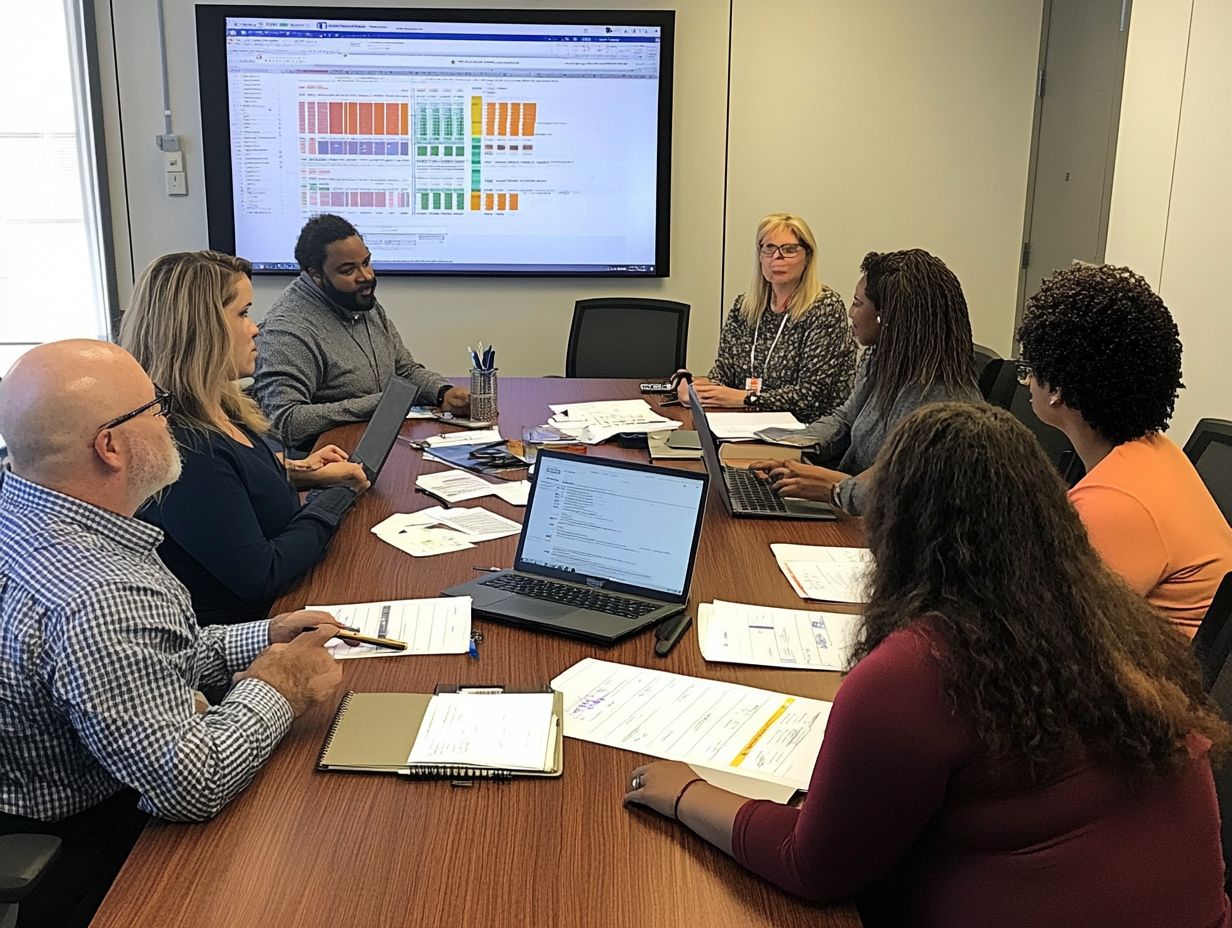“How to Ensure Consistency in CRM User Training”
In today s fast-paced business landscape, mastering Customer Relationship Management (CRM) is essential for your success.
The true power of any CRM system lies in the consistency and depth of user training you provide. This article delves into the significance of ongoing training, highlights the specific needs of your users, and outlines the key elements of an effective training plan.
From assessing the effectiveness of your training efforts to addressing common challenges, this guide offers practical insights to elevate user proficiency and retention within your CRM systems.
Get ready to boost your CRM training strategy!
Contents
- Key Takeaways:
- Importance of User Training in CRM
- Identifying Training Needs
- Developing a Training Plan
- Implementing Consistent Training Practices
- Evaluating Training Effectiveness
- Addressing Challenges in User Training
- Frequently Asked Questions
- What is CRM User Training Consistency?
- Why is Consistency Important in CRM User Training?
- How Can Consistency Be Achieved in CRM User Training?
- What Are the Benefits of Consistent CRM User Training?
- How Can Individual Learning Styles Be Accommodated While Maintaining Consistency in CRM User Training?
- What Are Some Best Practices for Ensuring Consistency in CRM User Training?
Key Takeaways:

Consistent training ensures users are knowledgeable about the CRM platform.
Assessing user knowledge and skill gaps is essential in identifying specific training needs and developing a targeted training plan.
Effective training programs should include key elements such as hands-on practice and ongoing support to ensure user proficiency and retention.
Importance of User Training in CRM
User training in Customer Relationship Management is essential for maximizing the potential of your CRM system, allowing you to elevate customer interactions and enhance overall efficiency.
When you invest in effective CRM user training, you significantly influence adoption rates. This creates an environment where your sales representatives, marketing teams, and customer service staff are empowered to connect with customers seamlessly.
By prioritizing comprehensive training resources and incorporating user feedback into your training modules, you can cultivate a culture of continuous learning. This approach not only improves data accuracy but also strengthens your user engagement strategies, setting your organization up for success.
Why Consistent Training is Essential
Consistent training is vital for your CRM adoption journey, as it directly addresses resistance to change and ensures you re well-equipped to navigate the intricate technicalities of the CRM system.
Ongoing training practices help create a culture of improvement within your organization.
When you and your colleagues regularly participate in training sessions, you ll become more confident and proficient in using the CRM. This translates to better data entry, enhanced customer interactions, and a noticeable boost in overall productivity.
The long-term benefits are unmistakable as you gradually embrace new processes and technologies, significantly easing the anxiety often tied to change.
By maintaining engagement through training efforts, you lay a solid foundation for sustained usage and truly maximize the return on your investment in the CRM system.
Identifying Training Needs
Identifying training needs is an essential first step in crafting effective CRM user training that aligns seamlessly with the unique requirements of various roles within your organization.
By assessing knowledge and skill gaps among users, CRM administrators can design tailored training modules that cater specifically to the demands of sales representatives, marketing professionals, and customer service agents.
This targeted approach boosts user recognition and fosters greater engagement, ultimately leading to more proficient use of the CRM system.
Assessing User Knowledge and Skill Gaps
Assessing your knowledge and skill gaps is crucial for developing targeted training resources that meet the needs of CRM users.
You can employ various methods to evaluate understanding, starting with surveys that capture initial data about experiences and confidence levels.
Formal assessments will help identify areas where knowledge might be lacking, providing a clear picture of your grasp of the platform.
By integrating ongoing user feedback, you create strong feedback loops that enable real-time adjustments and improvements in training modules. This approach ensures that CRM users have access to up-to-date information and resources tailored to evolving skill sets.
Start enhancing your CRM training today!
Developing a Training Plan

Creating a comprehensive training plan is essential for addressing all critical components of an effective training program, ultimately enhancing CRM user training outcomes.
This plan should encompass specific objectives, diverse training methods, and resources carefully designed to align with the customization capabilities of the CRM system. By doing so, you ensure that users have access to advanced learning materials perfectly suited to their specific roles.
Key Elements of a Successful Training Program
A successful training program for CRM users hinges on several key elements: clearly defined objectives, suitable training methods, and ongoing evaluation of training effectiveness.
This trifecta ensures maximum user engagement.
These foundational aspects create a structured approach and foster an environment where users feel both supported and motivated. Fun training methods, like interactive workshops and hands-on sessions, cater to diverse learning preferences, allowing participants to grasp the intricate functionalities of the CRM system seamlessly.
Using feedback from users helps make the training more relevant and effective. By regularly assessing comprehension through quizzes or practical applications, the training transforms into a dynamic process that adapts to your needs.
Ultimately, these strategies are essential for driving the adoption of CRM solutions and maximizing your return on investment.
Implementing Consistent Training Practices
Implementing consistent training practices is crucial for the long-term success of CRM user training, as it keeps you and your team aligned with the latest CRM system features and best practices.
By establishing a regular training schedule, your organization can facilitate ongoing learning, ultimately boosting user engagement and improving performance metrics.
Best Practices for Delivering Training
Delivering training using best practices is essential for maximizing user engagement and ensuring your CRM training programs are truly effective.
By employing a variety of techniques, you can significantly enhance the learning experience. For instance, integrating gamification strategies makes the training more interactive and enjoyable, capturing participants’ attention and encouraging a healthy sense of competition among them.
Implementing role-specific training approaches allows individuals to focus on relevant content, honing their skills in a targeted manner. Collaborative features, like group discussions and peer reviews, foster teamwork and knowledge sharing, enriching the overall training environment.
These user engagement strategies not only boost motivation but also ensure that the training material resonates with each learner, creating a lasting impact on skill retention.
Evaluating Training Effectiveness
Evaluating training effectiveness is essential in CRM user training. This process measures user skills and retention. It also highlights areas for improvement.
It’s a strategic approach that gives organizations the power to refine their training programs and enhance the overall user experience.
Measuring User Proficiency and Retention

Measuring user proficiency and retention is crucial for you to assess the long-term impact of CRM training programs and ensure ongoing engagement among users.
By utilizing various methodologies, you can implement training assessments that effectively gauge user understanding and skill levels over time. Performance metrics like task completion rates and error tracking offer critical insights into how well individuals are applying what they ve learned in real-world scenarios.
Establishing regular feedback loops, paired with engagement initiatives, reinforces learning, increasing the likelihood that users will retain essential skills and remain motivated to effectively utilize CRM systems.
Ultimately, fostering a culture of continuous improvement and support is key to maximizing the benefits of training, resulting in enhanced productivity and reduced turnover.
Addressing Challenges in User Training
Addressing challenges in user training is crucial for ensuring a seamless Customer Relationship Management (CRM) tool implementation.
Proactively tackling issues such as resistance to change and technical complexities can pave the way for a more effective adoption process.
Common Obstacles and Solutions
Common obstacles in user training include resistance to change and the intricacies of the CRM system. Developing effective solutions is essential for successful CRM adoption.
Users may often feel overwhelmed by new technologies, leading to frustration and disengagement. CRM administrators can help by offering tailored support and creating a user-friendly environment.
They can organize hands-on workshops and provide various training resources that cater to different learning styles. By fostering open lines for user feedback, they can continuously improve training materials to align with the evolving needs of learners.
Engaging with users and incorporating their suggestions elevates the training experience, driving greater acceptance and proficiency with the CRM system.
Frequently Asked Questions
What is CRM User Training Consistency?
CRM user training consistency refers to ensuring that all users of a CRM system are trained in a standardized manner, using the same materials and techniques.
Why is Consistency Important in CRM User Training?

Consistency in CRM user training helps ensure that all users have a similar understanding of how to use the system, improving overall efficiency and effectiveness.
How Can Consistency Be Achieved in CRM User Training?
Creating a standardized training program with the same materials, methods, and guidelines for all users can help achieve consistency. Regular reviews and updates to the training program maintain this consistency over time.
What Are the Benefits of Consistent CRM User Training?
Consistent CRM user training leads to increased productivity, improved user adoption, and better data quality. It also reduces confusion and errors, resulting in a more streamlined and efficient workflow.
How Can Individual Learning Styles Be Accommodated While Maintaining Consistency in CRM User Training?
To accommodate individual learning styles, offer a variety of training materials and methods, such as online tutorials, hands-on workshops, and written guides. This allows users to choose the best method while still receiving the same information.
What Are Some Best Practices for Ensuring Consistency in CRM User Training?
Best practices for ensuring consistency in CRM user training include creating a comprehensive training plan, providing ongoing support, regularly reviewing materials, and soliciting feedback from users to continuously improve the program.
Join us in enhancing your CRM skills today!
In summary, consistent training in CRM is vital for user engagement and effectiveness. By providing thorough, clear, and tailored training, organizations can maximize the benefits of their CRM systems.






